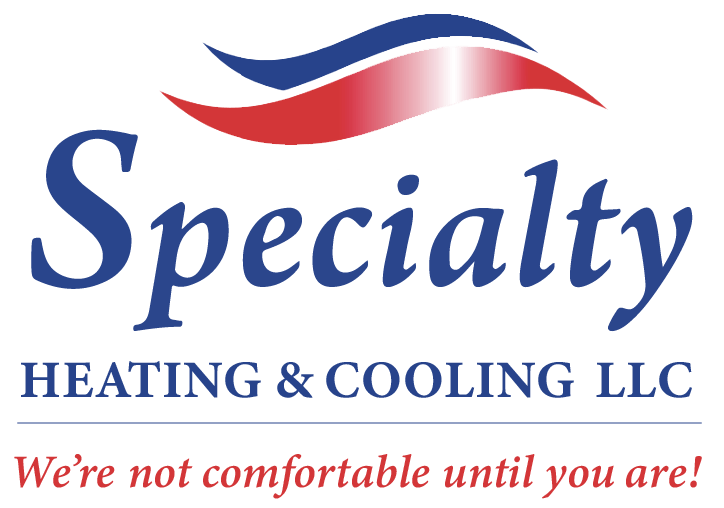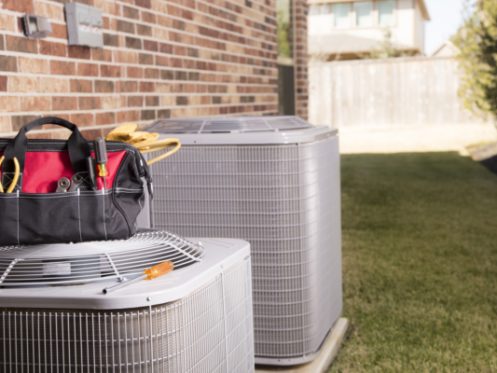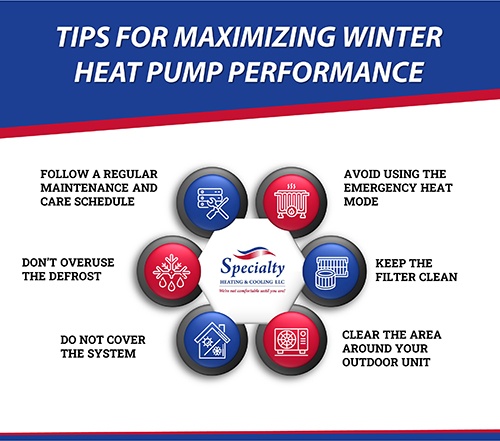Winter is a season when homeowners seek to improve energy efficiency. Colder temperatures, howling winds, and ice buildup on roofs can all impact the way your home holds and transfers heat throughout. Maintaining your heat pump well may significantly impact your home energy usage and costs, providing you with valuable data that will ultimately make you a smarter, savvier energy consumer.
A Word About Heat Pumps
Heat pumps are devices that transfer heat from one location to another. They work by extracting heat from the air or the ground outside and transferring it inside to heat your home. Heat pumps are considered highly efficient because they are able to provide heat at a much lower cost than other traditional methods such as natural gas or electric resistance heating. Heat pumps tend to work best in mild to moderate climates, using less energy to transfer heat from the air or ground when temperatures are still relatively warm.
Winter Heat Pump Use
Winter heat pump efficiency can decrease because of colder outside temperatures. As temperatures drop, it becomes more difficult for the heat pump to extract heat from the air or the ground. As compensation for this factor, a heat pump has a feature called auxiliary heat that kicked in when temperatures are simply too low for the pump to efficiently extract heat. The auxiliary heat source is typically provided by a furnace, which is less efficient than the heat pump alone.
Your heat pump may also need to run longer to maintain desired temperatures in your home. While the efficiency of your heat pump drops in the winter, there are some action steps you can take to ensure that you make the most of this technology while enjoying the significant savings that this type of heating can yield. Take these action steps to improve your heat pump efficiency, even in the wintertime.
Avoid Cranking Up the Thermostat
Setting your heat pump thermostat to high temperatures can decrease its overall efficiency. Heat pumps work most efficiently when they run at moderate temperatures for longer lengths of time. When you are tempted to crank up the heat on chilly nights, your heat pump will run for shorter periods of time and use more energy to bring temps up to your desired level.
Spiking your thermostat can put excess strain on your system, leading to increased wear and tear, frequent repairs, and a possible breakdown. Setting your thermostat at moderate temperatures and allowing it to run for longer periods of time will increase your system efficiency.
Avoid Using The Emergency Heat Mode
Your heat pump emergency heat setting should only be used in extreme circumstances, like when your heat pump is not functioning properly or temperatures outside drop below zero. The emergency heat setting bypasses normal heat pump function and uses a less efficient backup heating source such as electric resistance or gas furnace.
Using this emergency mode can significantly increase your energy consumption, leading to higher heating bills. Schedule regular repair and maintenance for your system to ensure that it is functioning well and you are able to address minor issues before they become major malfunctions.
Keep the Filter Clean
Keeping your heat pump filter is essential for a number of reasons. Dirty air filters restrict airflow and reduce your heat pump efficiency. Your pump must then work harder to heat or cool your home, leading to greater energy consumption and higher utility bills. Dirty filters also negatively impact indoor air quality by allowing dirt, dust, and pollutants to circulate through your home. This can cause a number of health consequences such as asthma, allergies, and other respiratory issues. A saturated filter can shorten the lifespan of your heat pump, placing stress on components of your system and resulting in costly repair and possible replacement. Checking your heat pump air filter regularly to ensure its proper fit and function will have a significant impact on the efficiency of your whole system.
Clear the Area Around Your Outdoor Unit
The outdoor unit of your heat pump needs proper space and airflow in order to function efficiently. If any part of it is blocked by debris, plants, dirt, or other objects, restricted airflow could compromise the function of your unit.
Electrical components present within this outdoor component must be properly maintained. A clear area around your heat pump unit will allow easy access for repairs. A heating technician will have a much easier time performing routine tasks like cleaning coils and checking refrigerant levels in your unit. Keep a recommended distance of at least two feet around all sides of your outdoor unit for best results.
Do Not Cover the System
Your heat pump is designed to sit outdoors; as such, it should not need to be covered in the winter. Choosing to cover your system could lead to serious complications such as mold growth, oxidation, and pest infestation. As tempted as you may be to try to remove ice from your unit, leave it alone. Your heat pump is well-equipped to manage all of this in its defrost mode.
Don’t Overuse the Defrost
Constantly switching your heat pump to defrost mode can have a negative impact on your system. The defrost mode uses a great deal of extra energy to melt ice and frost that have accumulated on outdoor coils. If the defrost mode is used for too long, it can significantly increase your energy consumption and lead to much higher utility bills.
This extra strain on your system can shorten your unit’s lifespan and result in frequent and costly repairs. This mode also causes your blower to stop indoors, which may negatively impact indoor air quality until you get things moving again.
Follow a Regular Maintenance and Care Schedule
Professional cleaning and maintenance at least once yearly will ensure more efficient performance for your unit, as well as prevent unexpected breakdowns. Here are some care steps that should be implemented each time your HVAC professional makes a visit.
• Clean or replace the filter regularly
• Clean and inspect indoor and outdoor coils
• Check refrigerant levels and adjust them when needed
• Calibrate the thermostat to ensure accurate temperature control of your unit
• Lubricate moving parts to reduce friction and wear
• Check and repair electrical connections as needed
• Inspect and clean drainage system
• Inspect and repair compressor fan as needed
Let’s Get You Running Efficiently, No Matter What The Season!
Serving valued clients in the Tigard area and beyond, Specialty Heating & Cooling LLC provides valuable solutions for your home HVAC system. Offering furnace maintenance, heat pump maintenance, furnace installation, heat pump replacement, furnace repair, heat pump repair, AC maintenance, cooling repair, ductless air conditioning service, indoor air quality services, and commercial HVAC services, we attend to all of your heating and cooling needs, giving you peace of mind that your home will remain comfortable and energy efficient year round. A commitment to excellent customer service, quality craftsmanship, and finding solutions that satisfy every client need are what drive us to provide you with the best we have to offer. Contact us today for information on how we can improve heat pump efficiency in your home and reduce your energy costs.


